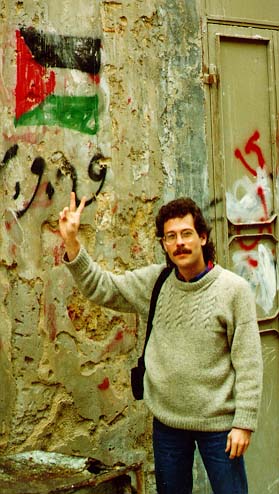

Selected Writings:
International Solidarity

Part Three of a Three-Part Series
 February, 1989
February, 1989
By Chris Frazer
In addition to the mounting toll of injuries and deaths, the Palestinians
have suffered a dramatic escalation of what the Israeli army calls
"collective punishment" -- mass intimidation aimed against entire cities,
villages and camps.
Refugee camps like Jalazone are hit hard by the army because they are traditionally the most militant cradles of the resistance.
Entering the camp, we are greeted with usual stampede of children flashing the victory sign and chanting in the only English many of them know: "PLO! Israeli No!"
Running about us helter-skelter, and brimming with excitement at the arrival of friends, they accompany us en masse to the site of a house recently demolished -- dynamited -- by the army. Sitting atop the remaining rubble of what was once a three-storey home, that housed a fourteen-person family, is a single tent.
Mohammed, the camp leader, said the house belonged to his oldest son, and was destroyed three days after Mohammed returned from a nine-month imprisonment in Ansar Three prison camp.
"Since the occupation, not one of my family has escaped arrest. This time I came home only to discover that my oldest son had been arrested ten days earlier," said Mohammed. "Then the army arrived, imposed a curfew, surrounded the camp, and destroyed my son's home."
This army did this to intimidate me and my family, to terrorize the people of the camp, and to destroy their spirit," he said. "But the plan backfired, because afterwards the entire camp of 8,000 people attacked the army with stones and drove them out."
Last year, Jalazone was the victim of the longest curfew ever imposed by the army -- forty-five continuous days.
"Curfew means that you cannot leave your home, not even for one minute, or you will be beaten, or tear-gassed, or even shot. The streets are constantly filled with soldiers," explained Mohammed.
"Normally, under curfew we are permitted to leave the camp for one hour each day to get food, but this time the army wouldn't allow even that for the first two weeks. They even refused to allow the Red Cross or UN to enter.
"During this curfew eight people died: four children, three men, and one woman. One child was a newborn who died of dehydration because his mother could not nurse and could not go out even to buy milk. An old man died when his home caught fire; he was not allowed to escape and no one was permitted to go and help him.
"This is inexcusable behaviour. How can we forgive this?"
Mohammed and fifty-one others were arrested in March during an arrest campaign organized by the Israeli army in an attempt to quell the initifada.
"When they came to arrest us, they tried to enter the camp for three weeks, but we stopped them," said Mohammed. "Finally they entered at night with 2,000 soldiers, using helicopters and armoured personnel carriers."
Five prisoners, including Mohammed, were sent to Ansar Three, the notorious prison camp located in the heart of the Negev desert, near the Egyptian border, and outside the West Bank. Their transfer to the camp was a violation of international law on two counts: no prisoners are to be transferred from the land under occupation; and they are not to be located near militarily-sensitive borders.
Their living conditions and treatment were nearly unbearable, said Mohammed. "We lived in tents, with twenty people each, without floors, on the open sand, with only rough boards and thin foam mattresses to sleep upon. It was extremely hot, reaching 45 degrees celsius at noon, and we were constantly exposed to hot wind and sandstorms."
Even the removal of shirts during the day was an offense punishable by solitary confinement. The hands of those thrown into solitary would be tied with plastic strips that tighten with every motion, cutting off circulation, and causing excruciating pain.
"We would be kept awake at night by the screams of those in confinement, and it would become a torture for everyone on the camp," said Mohammed.
Eventually the prisoners rioted when two Palestinians refused to work, and were shot dead by the warden.
Throughout the last year, the army has arrested nearly thirty thousand Palestinians. Of those, five thousand have been sent to Ansar Three and other detention camps.
Curfews and seiges have amounted to more than two thousand days, and nearly six hundred homes have been demolished or sealed, with more than five thousand individuals displaced as a result.
Yet despite these incredible hardships, the Palestinians not only endure, but find the strength to resist and fight back.
"There is nothing more that they can to do frighten us," said Mohammed. "At this moment, two hundred people from our camp are in prison, including my two sons, two of my grandsons, and one of my daughters. They have already murdered one of my sons. We don't expect anything else from the Israelis."



 on February 5, 1999
on February 5, 1999
